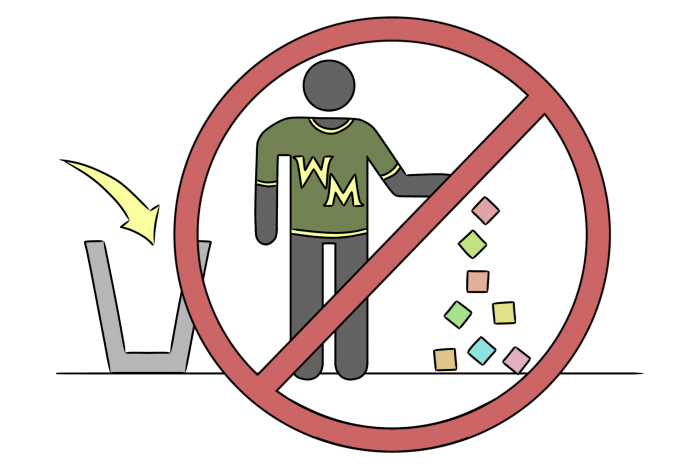On a campus where rainy days often turn into rainy weeks, warm weather and blue skies are a blessing. And if you’re anything like me, you put on a pair of shorts as soon as the forecast hints at 60-degree weather, much less 70. No doubt, it has been an excellent week to get outside, get together with friends and socialize in a COVID-safe way that is impossible when we’re kept inside by dreary conditions. And again, if you’re anything like me, you love it — but cringe about how the exodus of students almost always spells trouble for the beauty of our campus.
Let’s get it out there: the College of William and Mary has a litter problem. Whether it’s broken glass around Old Campus buildings, plastic lids blowing idly on the Sunken Garden or soda cans and granola bar wrappers out on the Matoaka trails, our whole campus is blanketed in a fine layer of food-related garbage. You’d be surprised what turns up when you just look. And when students go outside en masse, this food-related garbage understandably increases in both scope and amount.
In an age that has so strongly altered the way we get, eat and gather for our meals, we should expect that more areas of campus are being used for people to spread out. Each of these people come with an individually packaged meal and so on from a dining hall. Then, the wind picks up a napkin and takes it on a journey, the trashcans by Sadler Center and the Sunken Garden overflow from unusually high traffic, and random chance strikes. The net result is dispersed litter of all sizes under every step we take. For me, this is a huge concern.
My issue is not that garbage somehow ends up on the ground, but that it is allowed to stay there. I don’t think that I’m the only one who has seen the streaky toilet paper dried to the bricks outside of Yates, or the grocery bags that sometimes flit around The Terrace. But if I have a moment (and some hand sanitizer, depending on what the garbage in question is), you can bet that I’ll reach down and pick these things up. As we get the chance to go outside and leave rainy days behind, heightened use of outdoor spaces demands vigilance in trash disposal. We’re not living on a campus of “litter-ers,” but we do sometimes let meal and outdoor-time inconveniences slide. So, next time you’re enjoying the weather and come across an odd fork (or spoon) in the road, I hope you take the path that leads to a compost bin or trash can.
Ian DeHaven ‘23 is an international relations major committed to making things better one niche issue at a time. Ian is also involved in rowing, rollerblading, cello and dedicated Arabic study. Email Ian at cidehaven@email.wm.edu.

